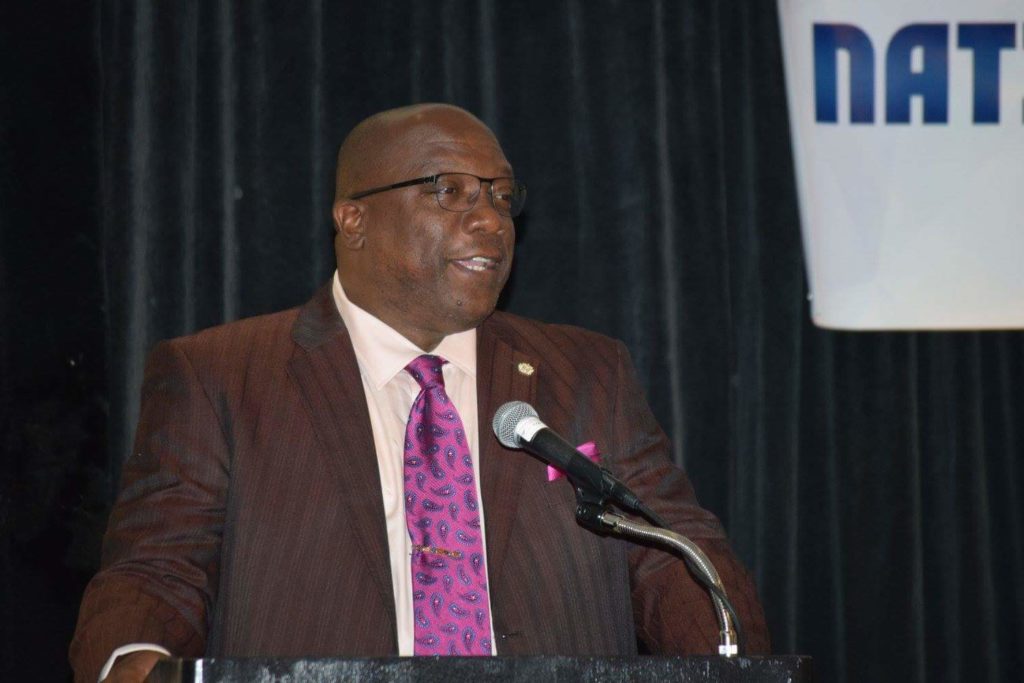This National Crime Reduction Symposium comes 2 weeks short of the two years unveiling of the Team Unity Administration, 22 February 2015. It is another example that illustrates the commitment of the Team Unity Government to do all that is necessary to tackle and reduce criminal activity in the Federation. We have brought together representatives from a wide range of stakeholder groups, as well as selected individuals, to examine the root causes of crime and to come up with strategies that potentially can reduce crime if systematically implemented.
Our discussions on the engagement of Dr. Neals Chitan date back as far as June 2016, when he was invited to engage in consultations on the implementation of a crime reduction framework that he has been promoting. A major recommendation emanating from that week’s consultations was the holding of a symposium to engage and challenge stakeholders to become more involved in crime reduction activities.
All of us can be the victim of criminal activities. All of us must want a safe and secure St Kitts and Nevis. I am glad that so many persons are here in solidarity with keeping our Country safe.
How Does The Symposium Fit In?
The Six Point Plan has, as one of its six broad strategies, Engagement of Stakeholders. The action points listed under this category include: encouraging the Ministry of Education and Social Services to re-invigorate the truancy programmes; creating interagency teams with Ministry of Health and PWD; development of victim support mechanisms, etc. These are all laudable objectives and plans.
Similarly, the Police Strategic Plan 2016-2019 also has laudable goals, such as: (i) ‘the Operations Directorate will create a Community Policing Plan centered around reducing gang activity’ (p.20); (ii) ‘(The Police Force) will adopt a community policing philosophy and will be part of the communities it serves and consults with. It will listen to, record and act on public information and concerns’. Although some efforts in ‘community policing’ have been made, community involvement in the fight against crime has not been very forthcoming at times. This of course has impacted negatively on the crime detection rates. Strategic and focused involvement in crime fighting efforts among civil society groups and even stakeholder government departments, apart from the security forces, is required if we are to achieve desirable outcomes.
In our planning discussions with the Regional Security System (RSS) back in August 2016, the RSS recommended that in order to properly fight crime in the Federation: (i) a whole-of-society approach is needed at the strategy level; (ii) a meeting of stakeholders be held; and (iii) as part of the overall plan, there should be ‘stakeholder and community efficiently networked involvement’. What are we doing today then, our coming together is consistent with the Police Six Point Plan, our Strategic Plan and the best advice and practice.
The roots of crime
Over the last three decades, regionally and internationally, almost every Country has experienced an increase in crime rates. Caribbean Countries from Bahamas, to Jamaica in the North and Trinidad and Tobago in the South, have experienced unsatisfactory levels of crime. It is not only a Caribbean and Latin America problem. Rising crime is an international problem.
Most perpetrators of crime are young men. While the vast majority of our youth are good, law-abiding citizens, unfortunately, if you look in many of the places where you find young people, too often you find seeds of the criminal elements being sown. Thus, youth gangs and drug use have infiltrated some of our secondary schools. Increasingly, girls are imitating their boyfriends and becoming involved in illicit and illegal activity. Our schools need special support.
Today, our keynote presenter will identify the root causes of crime from his perspective and you are going to be asked to come up with solutions and strategies to address these root causes of crime.
The root causes of crime are well documented and researched. Crime is primarily the outcome of multiple adverse social, economic, cultural and family conditions. To prevent crime it is important to have an understanding of its roots. These are complex and interrelated, but can be summarized in three main categories:
• Economic Factors/Poverty.
• Social Environment
• Family Structures
In addition to the lack of financial resources, poverty manifests itself in a lack of educational opportunities, lack of meaningful employment options, poor housing, lack of hope and the prejudice against persons living in poverty. Our social structure mirrors to citizens and communities what we value and how we set priorities. Social root causes of crime include: inequality, lack of support to families and neighborhoods, real or perceived inaccessibility to services, lack of leadership in communities, low value placed on children and individual well-being, and the overexposure to television as a means of recreation.The research strongly suggests that families are uniquely placed to raise healthy and responsible members of society. But the task of putting children first goes well beyond the family to include communities and society. Dysfunctional family conditions contribute to future delinquency. These conditions include: parental inadequacy, parental conflict, parental criminality, lack of communication (both in quality and quantity), lack of respect and responsibility, abuse and neglect of children, and family violence.
Crime prevention must focus on improvements in all three areas. What is the role of the Church, the School and the Home in crime prevention?
But at a wider level, today after Dr. Chitan’s presentation, different stakeholder groups will be challenged to determine their roles in crime prevention: the Media, what is your role? Sports Clubs and youth organizations, social services and community development, our school, the Health sector, the Chamber of Industry and Commerce, the Judiciary, the Politicians, including the Opposition, What is your role? More specifically, what will you do to try and reduce crime in the communities that you serve?
Our Expectations
Today, we have brought you here together each as representatives of stakeholder groups, or as individuals whom we think may have something to offer to enable us to outline strategies to curb the violence in the Country.
So what should emerge from this symposium will not be Dr. Chitan’s solution; not the solution of the Ministry of National Security; nor should they be just strategies to be pursued by the Police and the security forces. You have been carefully selected to attend this symposium. What we hope will emerge from this symposium will be immediate, short and medium term strategies that can be implemented to assist in stemming the rising incidence of crime in the Federation, particularly, violent and gun-related criminal activities. Note that I did not say long term (although this is a given). But we need strategies and programmes that help us turn around this state of affairs as soon as practicable.
A framework has been recommended by Dr. Chitan and has been endorsed by the Ministry of National Security as the organizing framework for our strategic response: EDER.
Enforcement : This is the ‘big one’ and immediate action. The Police and security forces MUST stem the level of criminal activity. Your suggestions will extend and complement the Police Six Point Plan and other initiatives outlined in the Police Strategic Plan.
Diagnosis: Dr. Chitan in his presentation will outline twelve psychosocial roots of crime that he has identified based on his research and experience, while interacting with youth/ youth gang members and their parents, criminals and prison inmates, etc around the world, and show how these roots lead to crime. During the discussion period, other roots or issues are likely to emerge as we seek to determine what is driving crime in the country and what can be done to address these ills that are feeding crime. We have deliberately invited to this symposium, a few parents who have lost love ones through violent crime. They know first- hand what it is like to lose someone perhaps due to gang violence. We hope that in their group they will share some thoughts that would help us better understand what is happening. We need to understand the pain, anguish and trauma. Equally we need to know how we can help these families cope, revive and engage in anti-crime efforts.
Finally, the framework addresses:
Rehabilitation: What can we do to change the mindset of persons while in our prisons? (We only have to refer to the recent homicides in St. Lucia where an individual who was recently released from prison is allegedly the lead suspect in the fatal attack on a female and her male companion. His children found the bodies. Imagine the trauma!). Here in St. Kitts and Nevis, there is intelligence that inmates of Her Majesty’s Prison may have sent out instructions that led to some of the homicides.
Improving and expanding meaningful n meaningful Rehabilitation programmes then must be a major component of the crime prevention plan, not only geared towards improving academic and technical skills, as important as these are, but getting deep into the heads of these individuals while in prison to try and change their mindsets. How do we do that? We hope that there would be recommendations for strategies and programmes to address prison rehabilitation. As Dr. Chitan has been promoting, do we change menaces into mentors?
Conclusion
Crime reduction is an urgent imperative in St Kitts and Nevis, St Lucia, Trinidad and Tobago, Bahamas, Belize, etc. Let us in St Kitts and Nevis be the leader in coming together for national good. The good is to make St Kitts and Nevis the safest place to live, to grow up, to work, to invest and to be.
This is still the bold desire of my Government. This is still what all well wishers and citizens of our beloved Country want.
Together we can achieve it. Together we will.
May this symposium bear fruit!



